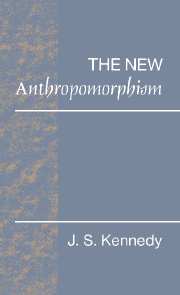Chapter 7
Published online by Cambridge University Press: 29 January 2010
Summary
Illusions
Most neobehaviourists (as defined on p. 6) ceased to worry about anthropomorphism years ago. They consider the battle against it was very necessary but was won by about the middle of the century. They do not believe that that way of thinking now represents any danger to the scientific study of animal behaviour. They are more concerned, especially in North America, with disposing of the last remnants of radical behaviourism. They believe that anthropomorphic language does no harm these days, at least among behavioural scientists, because they believe it is used purely metaphorically and refers only to functions, not causes. That is the view of zoological neobehaviourists at any rate, as expressed by Krebs & Davies (1981, p. 351) as we saw earlier (pp. 52–3). Also by Ridley:
“Mechanisms and purposes [i.e. functions] have been confused particularly often. However, now the distinction has been made it causes little difficulty” (Ridley 1986, p. 7). “Subjective intentions… are almost invariably ignored by ethologists…. It is a normal part of scientific procedure to take words from ordinary language and modify their meaning; the scientists are not confused by it, although outside commentators sometimes are.”
(Ibid, p. 177)These are no doubt comfortable beliefs but they do not seem tenable in the light of the preceding chapters.
Information
- Type
- Chapter
- Information
- The New Anthropomorphism , pp. 150 - 168Publisher: Cambridge University PressPrint publication year: 1992
